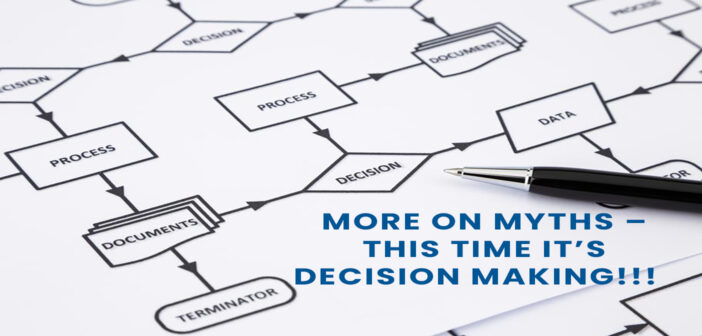Decision Making is a key strategic competency that all professionals should have. Unfortunately, it is not often identified as such and very little training is provided. It is often assumed that by the time you get to a certain level, you are a good decision maker. But there a number of deeply ingrained myths that we often revert to that make out decision process less than optimal. A recent article in HBR, “11 Myths About Decision-Making” notes “underlying these myths are three common and popular ideas that don’t serve us well: First, as busy people, we don’t need to invest time to make good decisions. Second, we are rational human beings, able to thoughtfully solve thorny and high-stakes problems in our heads. Third, decision-making is personal and doesn’t need to involve anyone else.”
Here is a summary of the 11 Myths:
- I Like to be Efficient. Rushing in to make a decision can be the kiss of death. You need to be clear on “what” you are solving for otherwise you WILL make a decision based on the wrong elements.
- I’m Too Busy. Taking your time to do a little up-front planning usually leads to better decision making and can actually save you time in the end.
- I Just Need to Solve this Problem at This Moment. A narrow focus may solve the wrong problem, or only partially solve the problem. A perfect example is “if your car breaks down, do you go out and buy a new car?
- This is My Decision Alone. Particularly in Strategic Sourcing, our important decisions, require input from our Stakeholders- don’t lose sight of this.
- I Know I’m Right – I Just Need Confirming Data. Confirmation bias has been behind some of the biggest decision disasters in history. Looking for contrary data can be a healthy way to test whether what you “want to see” is what you are actually seeing.
- I Trust My Gut. While trusting your gut may be a good sanity check, big decisions may require gathering new information and insights.
- Decision-Making is Linear. Good decision making requires going through a feedback loop that allows you to gather information, analyze it and perhaps gather more information before a final decision is made.
- I Can Pull a Decision Together in My Head. Big decisions usually require making a number of small decisions along the way. Keeping track of all those small decisions will allow you keep track of all the moving parts leading to a good decision.
- I Have All the Information I Need. Investing a little bit of time on research can improve your decision making and remove any inherent bias.
- I Can Make a Rational Decision. As much as we like to think that we make rational decisions, most are made based on past experience and emotion. Salespeople are masters at playing to your emotional responses.
- There is Just One Way to Do This. “Getting outside your routines and patterns leads you to see things differently” and can lead you to a better decision.
At The Mpower Group, we have an entire practice around building strategic competencies. All our workshops include having teams run through exercises where they are required to make decisions as a team. We have seen each and every one of the myths noted above come to life. One important way to avoid a number of these myths is to take time to plan and decide “how you are going to decide”. Whether you are in a team or making a decision on your own, taking a step back and pausing to think more strategically will allow you to get to better decisions.
Let us know what you think and join in the conversation . . . . . . .

